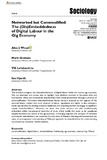Networked but Commodified: The (Dis)Embeddedness of Digital Labour in the Gig Economy

Download
Date
2019Author
Wood, Alex J.
Graham, Mark
Lehdonvirta, Vili
Hjorth, Isis
Metadata
Show full item recordImpact
Abstract
This article investigates the (dis)embeddedness of digital labour within the remote gig economy. We use interview and survey data to highlight how platform workers in Southeast Asia and Sub-Saharan Africa are normatively disembedded from social protections through a process of commodification. Normative disembeddedness leaves workers exposed to the vagaries of the external labour market due to an absence of labour regulations and rights. It also endangers social reproduction by limiting access to healthcare and requiring workers to engage in significant unpaid ‘work-for-labour’. However, we show that these workers are also simultaneously embedded within interpersonal networks of trust, which enable the work to be completed despite the low-trust nature of the gig economy. In bringing together the concepts of normative and network embeddedness, we reconnect the two sides of Polanyi’s thinking and demonstrate the value of an integrated understanding of Polanyi’s approach to embeddedness for understanding contemporary economic transformations.

